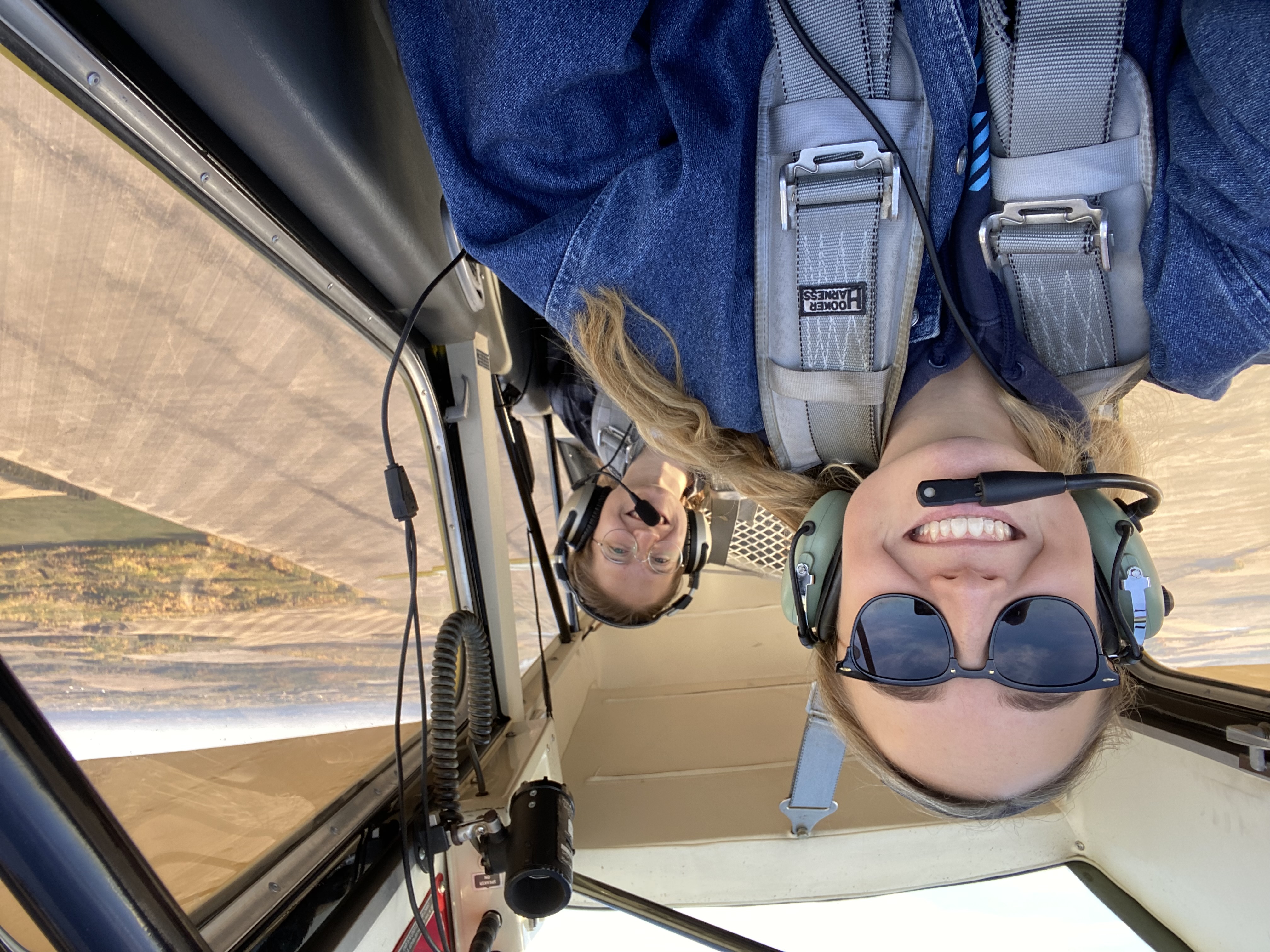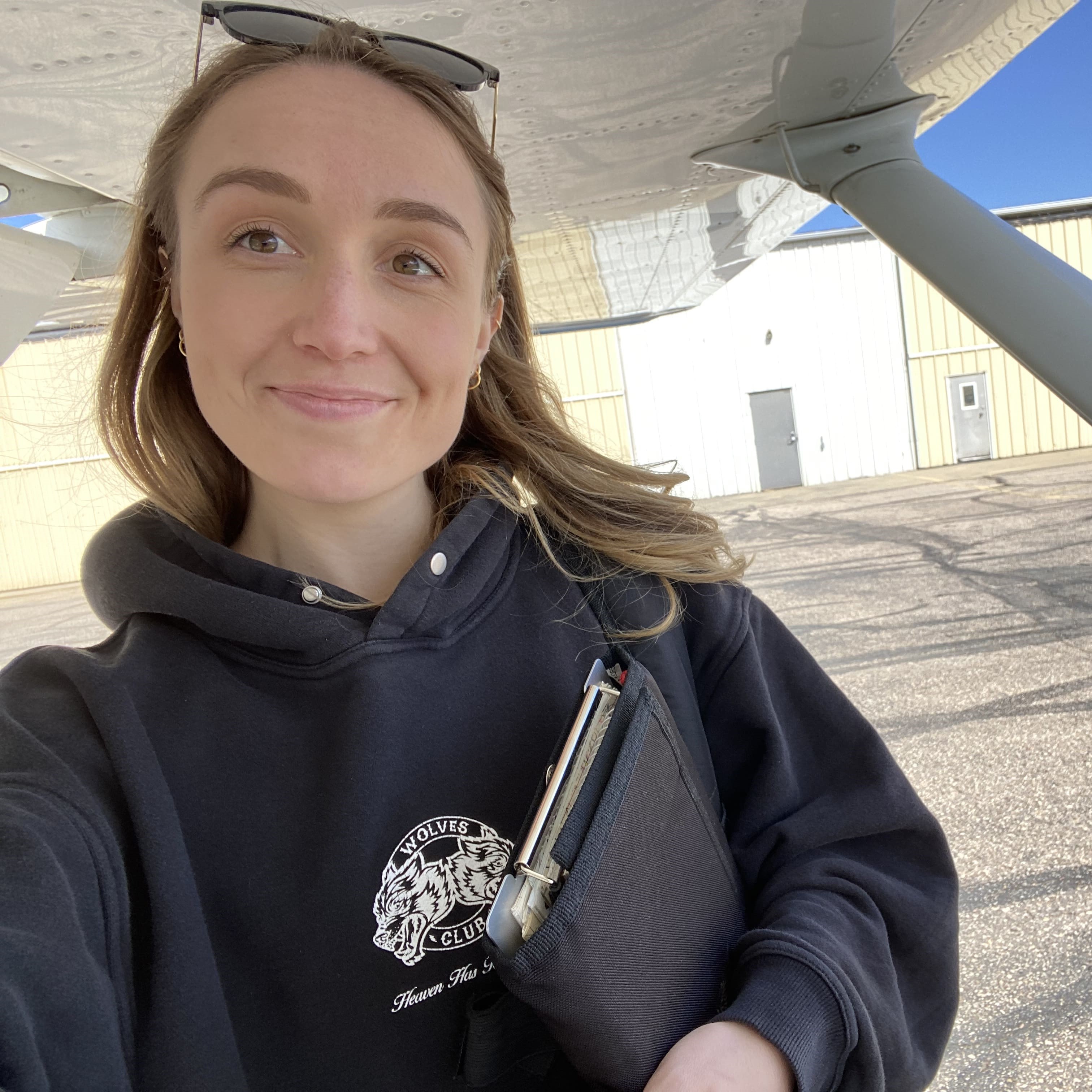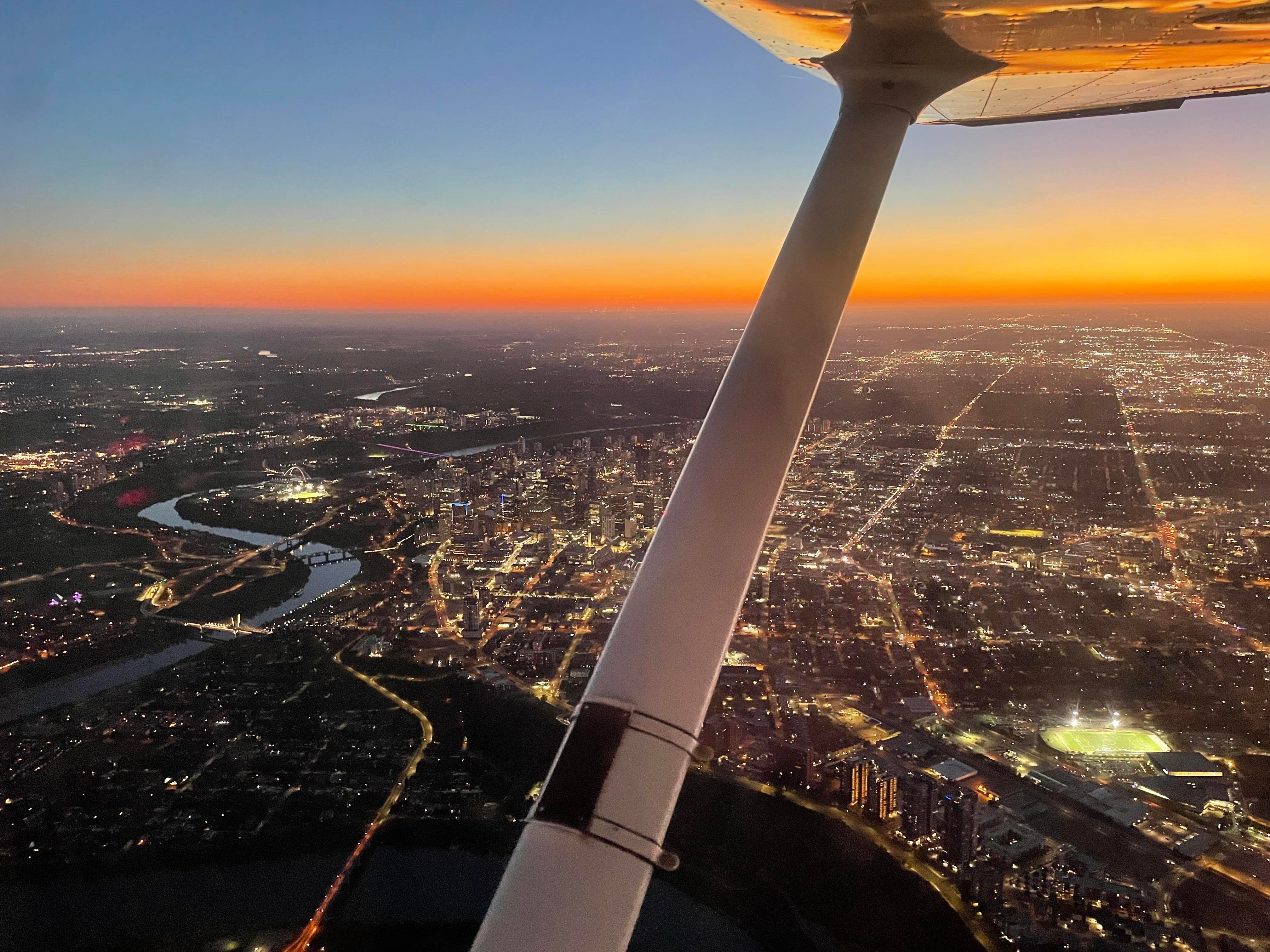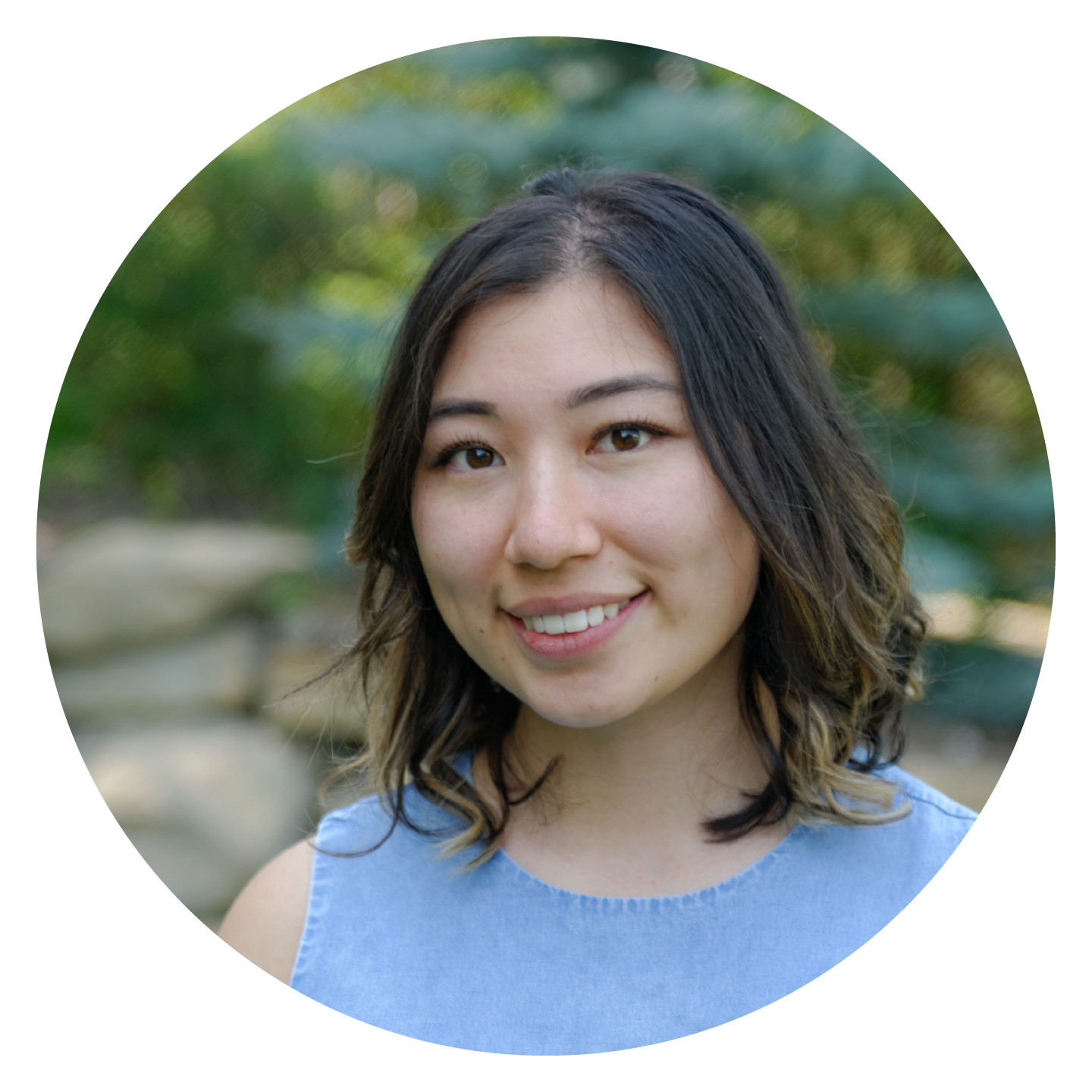Just how busy is Britt?
Britt Wiseman, a second-year medical student at the U of A, can be found soaring through the skies or working in Camrose for PNME, as part of the U of A MD program, to gain more clinical exposure in rural communities. She is highly involved in space medicine as lead of the Space Medicine Club at the U of A, Zenith Canada Pathways Mentorship Coordinator, a Representative for the Canadian Society of Aerospace Medicine (CSAM), Chair of International Outreach for North America for the Aerospace Medicine Student and Resident Organization (AMSRO) and participating in three research projects through the U of A and International Space University in Emergency and Space Medicine. In addition to navigating through these academic pursuits, she finds time to train for her commercial pilot's license, scuba dive, train for marathons, help with the Aerospace Medicine Podcast and take care of her dog Luka.

Flying the Citabria (tailwheel) for aerobatics rating/training.
How does she do this? Well here are some of Britt’s flight-tested tips!
Tip 1. Multiple mastery methods
Britt is no stranger to handwriting summarized versions of notes after a lecture or soaring through educational videos. She also draws lots of pictures to visualize her studies. However, she has also utilized fast ways to help solidify and supplement learning.
“After I have an understanding of the material, I often talk out loud and pretend that I am teaching it to someone else,” says Britt. She finds this strategy ensures she fully understands the material and can articulate it in her own words. When doing tasks like meal prepping, Britt also utilizes text-to-speech applications like Speechify to complete readings. From scientific articles to note summaries, she can listen and learn while multitasking mundane tasks.
Tip 2. Timetable tools
What kind of studier are you? Do you study best in small bursts with 15-minute breaks, or for long stretches at a time? For Britt it is the latter, so she tries to schedule in blocks of time where meetings and lessons occur sequentially for a maximum of half a day, so the rest of the day is blocked into uninterrupted exercise and a 4-5 hour study block. One size does not fit all, so find out what works best for your productivity, schedule and mental well-being.
As soon as Britt plans a meeting or schedules a lesson, it goes into her calendar. Having a reference for everything that goes on in her life allows her to pre-plan for busy or stressful periods such as the day before an exam. Know your exam dates so that you are prepared and can schedule post-exam weekends to catch up on tasks that are not as time-sensitive as school work.
“I am pretty efficient now at knowing how long certain tasks will take me, so I can schedule these in more specifically such as studying for a quiz, writing an application or prepping for a flight lesson,” says Britt. With experience, you can better predict how much time must be allotted to complete a task and can schedule accordingly. Britt also sometimes fills a general work session in her calendar with a few options for what she can work on. That way, if she is unmotivated to complete a certain task, she can switch to another task. For example, these work sessions could be used for studying or as possible spaces for a last-minute meeting to enable flexibility.
And it is not just school and training Britt plans. For example, on Fridays after lectures, she always sets aside time to exercise or talk with friends. Making time for yourself is just as important to schedule -- and start planning early to be prepared and productive.
Tip 3. Practical prioritizing
School, alongside a constant meal preparation and exercise schedule, is always prioritized first.
“I budget time for medical school so that I am on top of the material, and tasks are ordered based on deadlines.” On top of school and exercise, she typically organizes 1-2 tasks to complete as it is easier to manage. This is why planning early is so important to enable flexibility in completing different tasks.
Once tasks are assigned to a timeframe, Britt utilizes reminders on her phone to remember when to send out emails about events, check in with people from organizations or other to-do’s. Once a task is identified, it is often broken down and completed one at a time. For example, if there is a flight lesson, Britt budgets time to review prior to flying. If there is a research project, she indicates goals that can be completed in the week time frame that will allow her to meet deadlines. Prioritizing is important to avoid becoming overwhelmed. Make the priority list short, and rank tasks based on both deadline and importance.

At the Namao Flying Club for CPL training
Tip 4. Joy in the work
As a marathon runner, Britt knows how important the journey is to the finish line. For her, she has a genuine passion for everything she is doing, which helps her stay motivated. Many of her space research and flying goals are long-term goals that she enjoys doing. Whether it's getting a new rating for flying or working on a research project, each step to her goal is an experience that comes with memories and opportunities to learn.
The diversity of her work also avoids monotony. “Some days I really don’t want to do a certain task, so I just switch to something that feels more congruent for that day,” says Britt. Also, surrounding herself with motivated and passionate people is a positive influence on her work. When training for a marathon, Britt finds enjoyment through runs in her community, steps she takes after the race begins and all the way past the step over the finish line. Reflect on what you love and why you love it, and recognize that you can pursue more than just one passion.
Tip 5. Balancing beneficial breaks
Emphasis is placed on getting sleep every night, meal prepping nutritious food and getting exercise. “These things help me to perform at my best,” says Britt. She also visits a therapist regularly, spends time with her dog and carves out protected time to see her friends and family for her mental wellness. Sometimes these activities need to be scheduled to make sure it happens, which is important to maintain connections with those she cares about.
“I also make sure to treat myself with kindness,” says Britt. If she is tired and is not able to complete a task, it is okay. She can refocus the next day. If there is a very hectic week, at the end she makes sure to cook something enjoyable or catch up with a friend to have something to look forward to. It is important to take care of yourself to perform your best and maintain the things in life that you enjoy.
Conclusion: time management and burnout
“This is something that I have worked on, since I have definitely experienced burnout before,” says Britt. “A big thing that I try to do is only sign up for things that I am genuinely interested in.” Rather than volunteering because they looked good on her CV, she has learned that opportunities are everywhere. And you can pick activities that align with your goals and interests. Work culture is also very important, and she tries to pick research teams or organizations that are positive and supportive. A negative work atmosphere can add additional stress.
In her undergraduate degree, she told herself she couldn't take breaks or see her friends as much because she didn’t have the time. Nowadays, it is important to schedule breaks and time to do these things because they matter and help her feel better in the long run.
Time will fly by, so make sure you enjoy the journey and carve out time for what is important to you in a sustainable way.

YEG Flight Lesson Sunset View
For your information: organizations Britt is involved in
For those that are interested in what Britt is currently involved in and want to learn more, here is a non-exhaustive list of opportunities and organizations for those interested in pursuing a similar path.
- Pre-Clinical Networked Medical Education Program (PNME):
- As part of second-year medical school, some students are able to spend a couple months in a rural community to gain more clinical exposure.
- Zenith Canada Pathways Space Fellowship
- Providing Internships, mentorships and a network to Canadian students interested in the space industry
- Space Medicine Club (Medical Student Association)
- Hosting events and speakers in the field of space medicine, and enables networking of students with common interests. They also collaborate with AMSRO/CSAM.
- AMSRO/CSAM chapter
- Aerospace Medicine Podcast: Research and social media
- An international effort bringing speakers and their work to the public.
- Canadian Society of Aerospace Medicine
- Provides information on aerospace medicine, mentorship opportunities and networking. Thanks to Britt, the first chapter at U of A may soon be formed.
- North America (Aerospace Medicine Association: Student and Resident Organization, AsMA-AMSRO)
- Provides informational content through social media and resources for groups interested in aerospace medicine throughout the world. Seminar events are also planned every year for members.
- Big Brothers Big Sisters
- A volunteer-based mentorship platform that plans activities to engage with youth.
- Antarctic Ice Marathon
- An extreme athletic feat for runners, this marathon occurs every year in the Arctic regions. Britt is also conducting research on extreme environmental physiology and psychological resilience tactics from endurance athletes.
- International Space University SSP23
- ISU provides various courses and network opportunities, and the Space Studies Program is a 9-week intensive interdisciplinary course with hands-on learning and networking opportunities with space industry professionals and researchers around the world. Britt is contributing to ongoing research on Metaverse (VR/AR) in medicine, and also will be working on projects looking at the human microbiome and how it is altered during spaceflight.
- USMLE
- US Medical Licensing Exam. There are three steps that need to be completed in order to be licensed to practice medicine in the US. Britt is looking to complete additional medical training on aerospace/space medicine + dive medicine in the future and is writing these exams to keep doors open.

